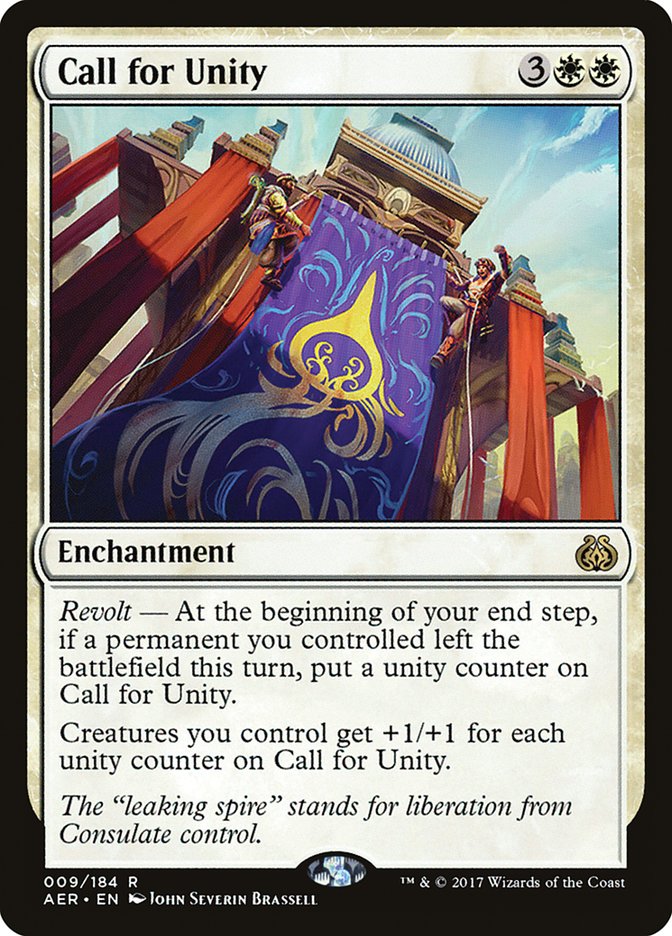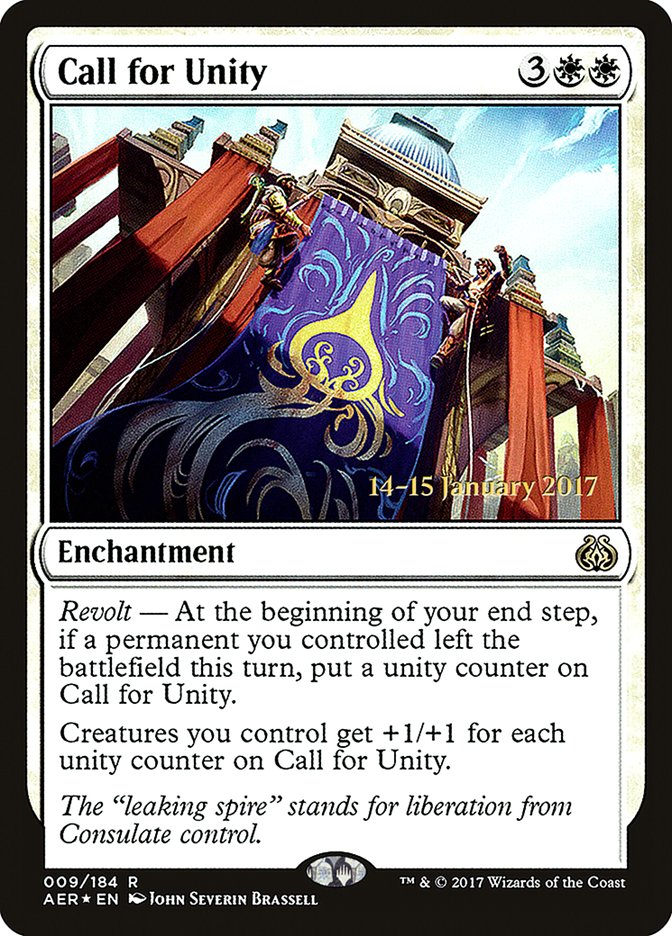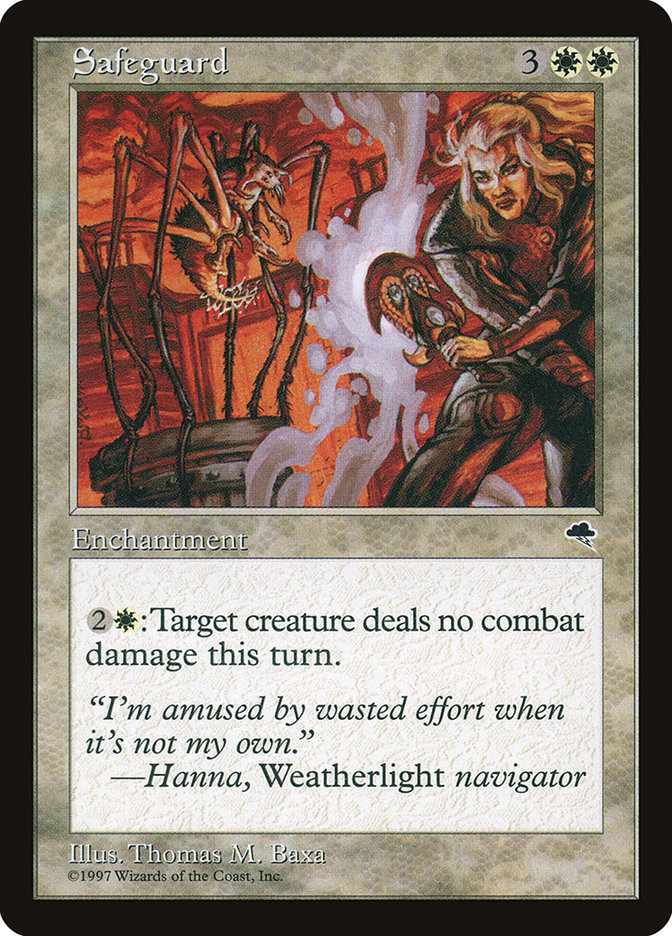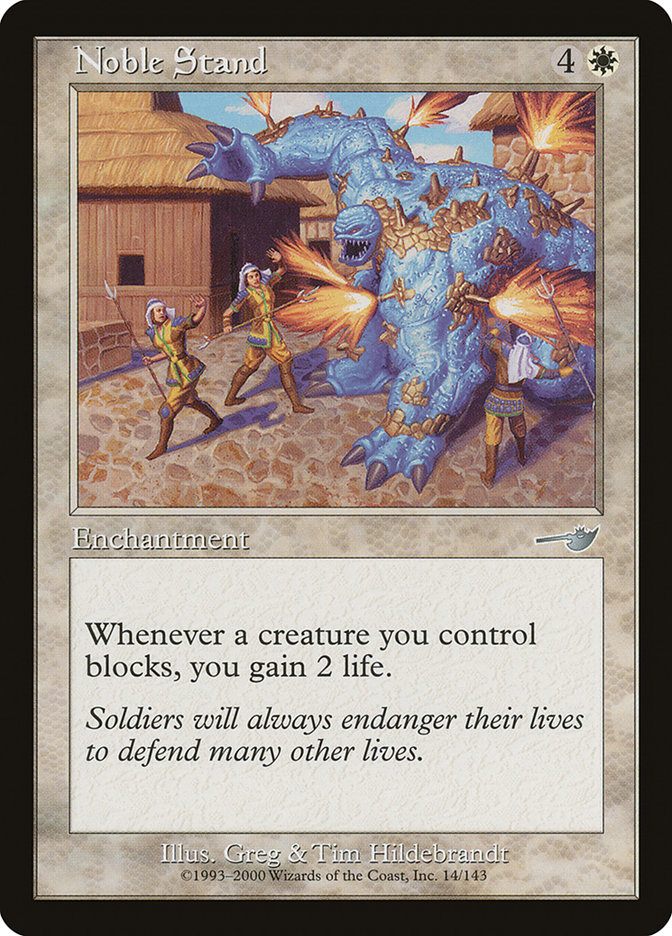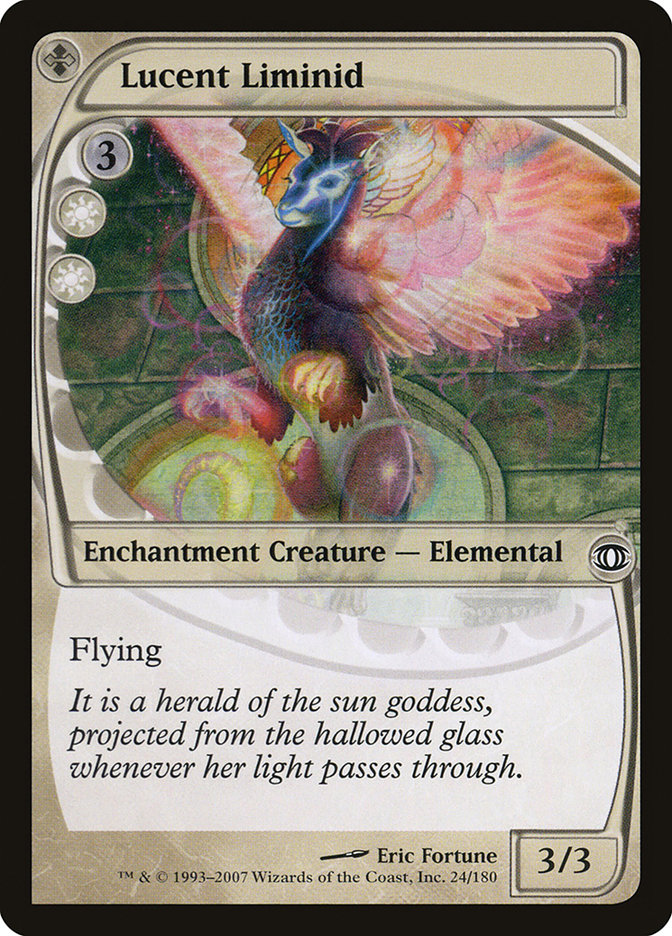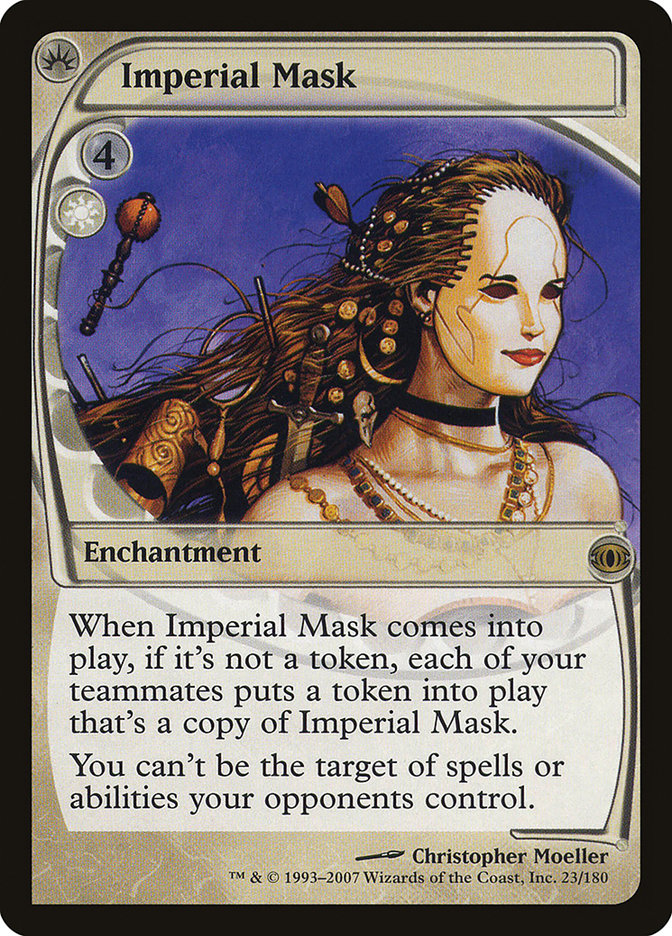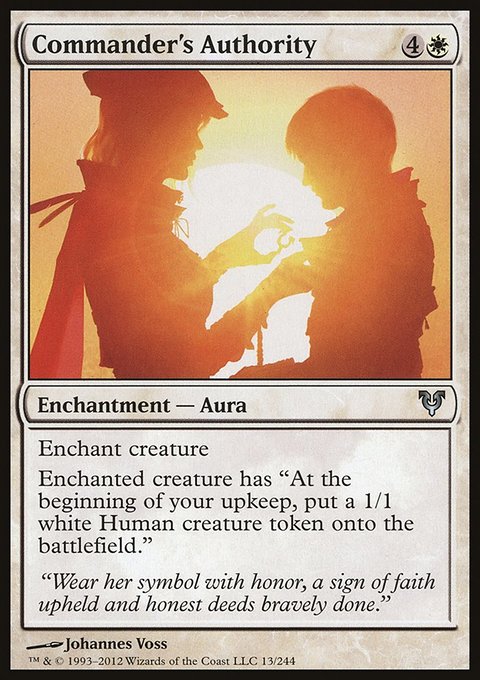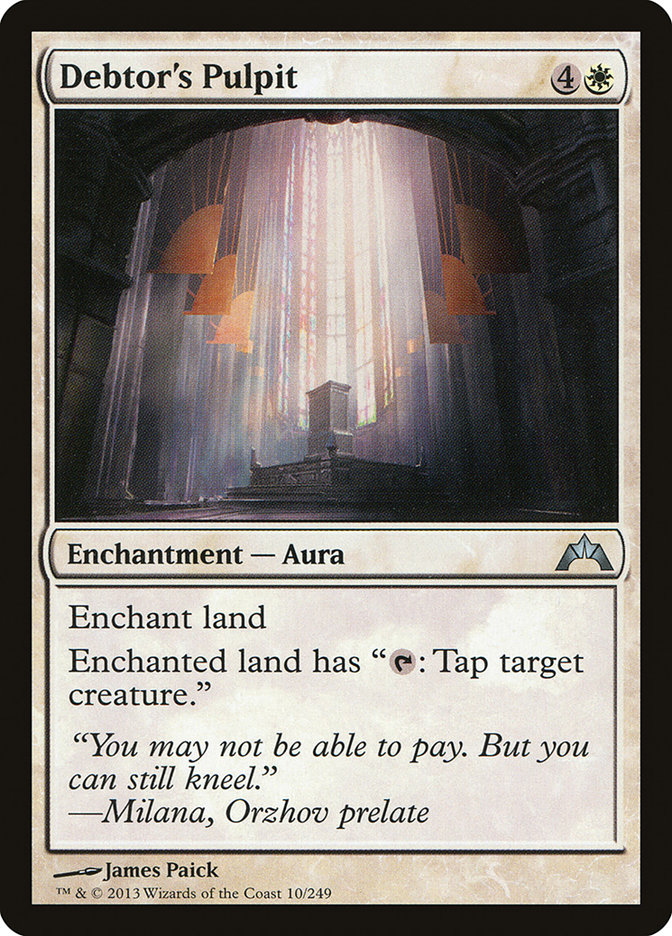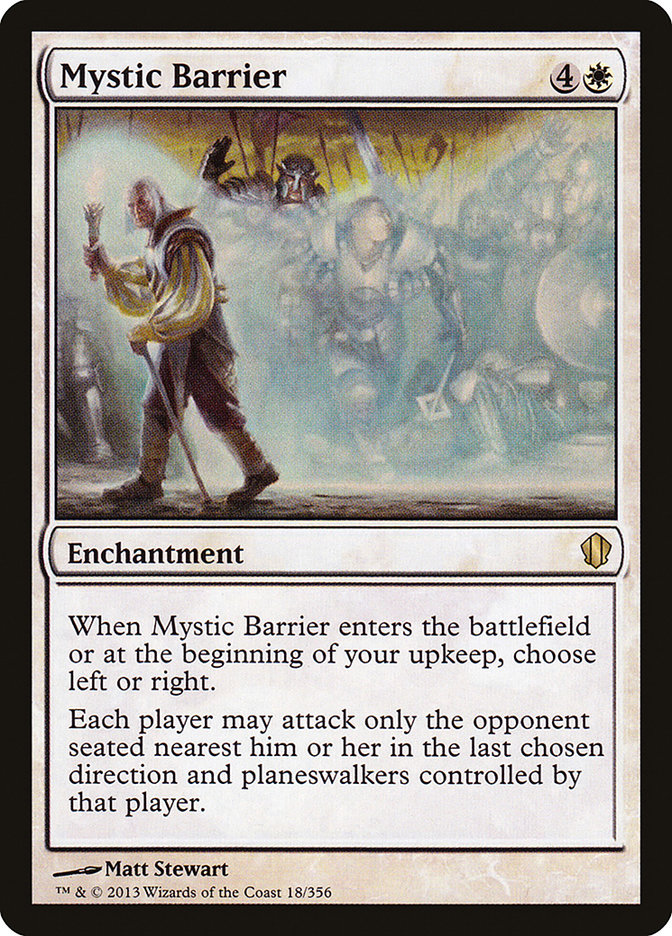Call for Unity MTG Card
| Card sets | Released in 3 setsSee all |
| Mana cost | |
| Converted mana cost | 5 |
| Rarity | Rare |
| Type | Enchantment |
| Abilities | Revolt |
Text of card
Revolt — At the beginning of your end step, if a permanent you controlled left the battlefield this turn, put a unity counter on Call for Unity. Creatures you control get +1/+1 for each unity counter on Call for Unity.
The "leaking spire" stands for liberation from Consulate control.
Cards like Call for Unity
Exploring the landscape of enchantments in Magic: The Gathering reveals the distinctive qualities of Call for Unity. This card shares its enchantment nature with Citadel Siege, another card that also offers ongoing advantages based on certain triggers. However, Call for Unity is unique with its reliance on the revolt mechanic, which powers up your creatures whenever a permanent you controlled left the battlefield during your turn. Citadel Siege, by contrast, allows you to choose between two modes during the beginning of combat on your turn, offering more immediate but less potentially escalating benefits.
Collective Effort is another enchantment that bears resemblance but with a one-time multipurpose effect that requires tapping creatures as an additional cost. Like Call for Unity, Collective Effort is built around unity and teamwork, but Call for Unity remains distinct with its cumulative advantage over multiple turns. Then there is Glorious Anthem, a straightforward card that provides a consistent creature buff. While Glorious Anthem offers a reliable increase, Call for Unity has the potential for a larger boost to your creatures, given the right conditions and time to develop.
In weighing these enchantments, Call for Unity stands out for players who prefer cards that grow in strength and capitalize on the natural course of the game, affirming its place among MTG’s intriguing tapestry of creature enhancement strategies.
Cards similar to Call for Unity by color, type and mana cost
Card Pros
Card Advantage: Call for Unity can significantly enhance your board presence over time through the accumulation of +1/+1 counters, effectively turning even the most unassuming creatures into substantial threats. This growth works to your advantage by making each of your creatures individually stronger and more costly for your opponent to deal with.
Resource Acceleration: While not directly providing mana acceleration, Call for Unity’s consistent buff to your creatures can help in indirectly speeding up your victory. As your creatures grow, you will need to invest fewer resources into deploying additional threats, allowing you to allocate your mana towards other strategic plays that can lead you closer to victory.
Instant Speed: Though Call for Unity itself does not operate at instant speed, its Revolt ability can be triggered during any turn, essentially allowing the card to interact on a level similar to instant-speed play. This means you can plan and execute strategies that enable the Revolt trigger, such as sacrificing a permanent or utilizing a fetch land, during your opponent’s end step or in response to their actions, ensuring that Call for Unity works as a reactionary force multiplier.
Card Cons
Discard Requirement: Unlike other enchantments that offer value upon entry, Call for Unity can be slow to start, requiring the setup of creatures leaving the battlefield to trigger its Revolt ability, which may not always align with your game plan.
Specific Mana Cost: With a mana cost that includes two white and three generic, this enchantment calls for a dedicated mana base, making it less flexible and harder to cast in multi-colored decks that don’t prioritize white mana.
Comparatively High Mana Cost: Five mana to begin accruing value can be prohibitive, especially in formats where tempo is crucial. Cards that demand this level of investment are often compared unfavorably to other options that contribute to board presence or card advantage more efficiently.
Reasons to Include Call for Unity in Your Collection
Versatility: Call for Unity is a card that seamlessly fits into a variety of deck builds, particularly ones that favor a longer game. Its ability to gradually strengthen your creatures is invaluable in formats where board presence and creature buffs are paramount to victory.
Combo Potential: With each permanent you lose, you accrue counters that make your creatures stronger. This mechanism works splendidly with strategies that involve sacrificing permanents for greater benefits or those that already include counter manipulations.
Meta-Relevance: Given that creature-based strategies are often at the core of many metagames, Call for Unity can be a game-changer. It shines in environments where the board is constantly contested and maintaining a strong lineup of creatures can dictate the game’s outcome.
How to beat
The Call for Unity card brings a unique blend of boosting your creatures on the battlefield as you rally your defenses in Magic: The Gathering. Its continuous accumulation of +1/+1 counters on creatures necessitates a strategic approach to counter its potentially game-swinging effects. To effectively counteract Call for Unity, consider leveraging removal spells that can clear the board before the enchantment’s power snowballs out of control. A well-timed board wipe, such as Supreme Verdict or Wrath of God, can negate the advantage gained from the accumulated counters.
Enchantment removal spells like Disenchant or Mortify also offer a direct solution, allowing players to remove the Call for Unity before it becomes overwhelmingly potent. Alternatively, countering the card upon its initial casting with a spell like Negate ensures that it never hits the battlefield, thereby preempting its threat entirely.
In summary, to maintain the upper hand against Call for Unity, it is critical to have a strategy that involves board control and precise timing. By disrupting your opponent’s plan and managing the state of the battlefield, you maintain a competitive edge against decks utilizing this powerful enchantment.
BurnMana Recommendations
Whether you’re bolstering your defenses or crafting a strategy that thrives over the long haul, Call for Unity can be a cornerstone in your MTG collection. As your enemies muster their forces, this enchant is there, transforming every loss into a powerful gain. Picture your creatures, each growing stronger, challenging your opponent to find an answer to this uprising. Combine it with cards that complement its mechanics, and you’ve got a deck that not only evolves but excels in resilience. Curious about the best ways to leverage Call for Unity’s power or seeking strategies to counter it? Dive in with us to enhance your gameplay and ensure your deck is a force to be reckoned with.
Where to buy
If you're looking to purchase Call for Unity MTG card by a specific set like Aether Revolt and Aether Revolt Promos, there are several reliable options to consider. One of the primary sources is your local game store, where you can often find booster packs, individual cards, and preconstructed decks from current and some past sets. They often offer the added benefit of a community where you can trade with other players.
For a broader inventory, particularly of older sets, online marketplaces like TCGPlayer, Card Kingdom and Card Market offer extensive selections and allow you to search for cards from specific sets. Larger e-commerce platforms like eBay and Amazon also have listings from various sellers, which can be a good place to look for sealed product and rare finds.
Additionally, Magic’s official site often has a store locator and retailer lists for finding Wizards of the Coast licensed products. Remember to check for authenticity and the condition of the cards when purchasing, especially from individual sellers on larger marketplaces.
Below is a list of some store websites where you can buy the Call for Unity and other MTG cards:
 BUY NOW
BUY NOW BurnMana is an official partner of TCGPlayer
- eBay
- Card Kingdom
- Card Market
- Star City Games
- CoolStuffInc
- MTG Mint Card
- Hareruya
- Troll and Toad
- ABU Games
- Card Hoarder Magic Online
- MTGO Traders Magic Online
See MTG Products
Printings
The Call for Unity Magic the Gathering card was released in 3 different sets between 2017-01-20 and 2023-06-23. Illustrated by 2 different artists.
| # | Released | Name | Code | Symbol | Number | Frame | Layout | Border | Artist |
|---|---|---|---|---|---|---|---|---|---|
| 1 | 2017-01-20 | Aether Revolt | AER | 9 | 2015 | Normal | Black | John Severin Brassell | |
| 2 | 2017-01-20 | Aether Revolt Promos | PAER | 9s | 2015 | Normal | Black | John Severin Brassell | |
| 3 | 2023-06-23 | Tales of Middle-earth Commander | LTC | 163 | 2015 | Normal | Black | Yuriy Chemezov |
Legalities
Magic the Gathering formats where Call for Unity has restrictions
| Format | Legality |
|---|---|
| Commander | Legal |
| Legacy | Legal |
| Modern | Legal |
| Oathbreaker | Legal |
| Vintage | Legal |
| Duel | Legal |
| Pioneer | Legal |
| Penny | Legal |
Rules and information
The reference guide for Magic: The Gathering Call for Unity card rulings provides official rulings, any errata issued, as well as a record of all the functional modifications that have occurred.
| Date | Text |
|---|---|
| 2017-02-09 | All cards in the Aether Revolt set with triggered revolt abilities use an intervening "if" clause. A permanent you controlled must have left the battlefield earlier in the turn in order for these abilities to trigger; otherwise they do nothing. In other words, there's no way to have the ability trigger if no permanent you controlled has left the battlefield that turn, even if you intend to have one do so in response to the triggered ability. |
| 2017-02-09 | Energy counters aren't permanents. Paying won't satisfy a revolt ability. |
| 2017-02-09 | Revolt abilities check only whether a permanent you controlled left the battlefield this turn or not. They don't apply multiple times if more than one permanent you controlled left the battlefield. They don't check whether the permanent that left the battlefield is still in the zone it moved to. |
| 2017-02-09 | Revolt abilities don't care why the permanent left the battlefield, who caused it to move, or where it moved to. They're equally satisfied by an artifact you sacrificed to pay a cost, a creature you controlled that was destroyed by Murder, or an enchantment you returned to your hand with Leave in the Dust. |
| 2017-02-09 | Tokens that leave the battlefield will satisfy a revolt ability. |
